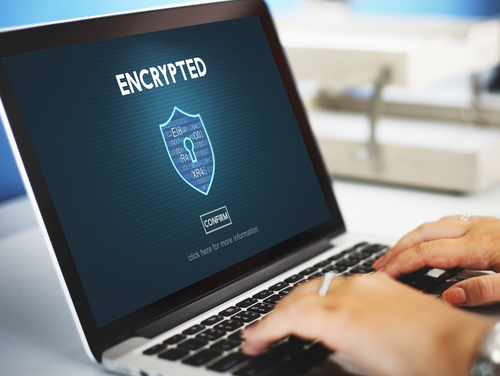Encryption is one of the most popular ways to ensure that your internet activity, emails, and instant messaging are safe from hackers. People promote encryption as one of the safest ways to navigate the internet, but can encryption algorithms be broken? Is encryption safe?
Hacking encryption algorithms is possible, but it takes a lot of time, energy, and technical knowledge. Also, encryption alone cannot keep you from being hacked. Read on to learn more about how to protect yourself from hackers by using encryption alongside other security practices.

How Does Encryption Work?
Encryption is when you scramble text to make it unreadable. There are several algorithms used to scramble the text and use symbols to represent the text. After the text is scrambled, it needs a cryptographic key to make meaning of the random symbols.
The sender usually has one key that encrypts the text and the recipient has the corresponding key that decrypts the text. Encryption works by using a combination of symmetric and asymmetric keys to encrypt and decrypt the text.
Encryption makes it harder for cybercriminals to just peak in on your communications. When they try to intercept the communication, the text appears as nonsense. For the hacker to gain access to your text, they need the key to decrypt the message.
Can Encryption Algorithms Be Broken?
The short answer to this question is yes. Encryption codes can be broken. All encryption codes are a series of complex mathematical problems that eventually can be solved. However, it is difficult. For a hacker to crack an encryption algorithm, they need technical knowledge, advanced tools, and lots of time.
Different encryption protocols are more secure than others. Some encryption algorithms have been tested for vulnerabilities for decades without success. However, eventually, with enough time, any encryption protocol can be cracked. It just takes time, and in some cases that time is estimated to be several billions of years, with current technology.
Breaking an encryption algorithm is similar to guessing someone’s password. With enough attempts, eventually, someone will crack it. This is called a brute force attack. Essentially, a hacker uses trial and error to break the encryption algorithm and gain access.
However, for a hacker who is looking to make money or gain some knowledge by breaking the encryption, this brute force tactic would not be the best use of time and effort, especially with some of the more complicated encryption algorithms like AES-256.
So, encryption is still one of the best ways to protect your data, even if it is not perfect.
Could Quantum Computers Break Encryption Codes?
A quantum computer uses quantum mechanics to solve problems too complex for classical computers. Quantum computers use qubits, which are subatomic particles that carry digital information, to create a large amount of processing power.
Companies such as IBM, Google, and Rigettic Computer use cooled superconducting circuits to create temperatures lower than the frigid temperatures of space. These super-cooled circuits allow these companies to isolate qubits in a controlled quantum state.
Qubits can be in multiple states simultaneously, which is called superposition. As such, researchers have to use precise microwave beams to manipulate them. Through the use of entanglement, an unexplained phenomenon when a pair of qubits exist in a single quantum state, scientists can create chains that give the machine the ability to speed through calculations.
This process creates a supercomputer that can run through a large number of mathematical equations very quickly. So, in theory, a quantum computer is powerful enough to break even the toughest of today’s encryption algorithms.
However, quantum computers currently only exist in scientific laboratories and universities. Several are owned by leading technology research companies. They are currently only used for experiments and there are several limitations to what they can do.
The technology is still emerging and the qubit has a fragile state that makes it difficult for existing technologies to keep the information. So, quantum computers only have a limited amount of time that they can spend on such calculations.
Can AES-256 Be Cracked?
Advanced Encryption Standard (AES) is a well-known encryption protocol that is used for many applications, including encrypting government classified files. This protocol uses a symmetric block cipher to encrypt and decrypt data.
There are different block rounds of encryption that AES can be put through to increase the difficulty of decoding the cipher. There is AES-128, AES-192, and AES-256. AES-256 uses a 246-bit key for 14 rounds to encrypt data using substitution, shifting, and mixing to scramble the information.
In a study, researchers used a side-channel attack (an attack that works by exploiting a systems supply current, execution time, or electromagnetic emission to gain information) to recover the cipher key for an AES-128 encrypted device.
They retrieved the key from a power trace of the hardware using a Support Vector Machine. They had a 35% success rate of predicting the entire cipher key using this method. However, AES-256 is a stronger algorithm. Currently, no one has been able to crack it.
Researchers theorize it would take someone conducting a brute-force attack billions of years to crack the code of AES-256 using our current technology.
Is Encryption Safe?
As it stands, encryption is one of the most effective ways of keeping your data safe. But, how safe is encryption? Although strong encryption algorithms are virtually impossible to crack using brute force.
Hackers employ a variety of tactics to gain access to information. One way that encryption can be bypassed is through errors in implementation.
Open Source vs. Proprietary Algorithms
Many people believe that open-source encryption algorithms are stronger because they are scrutinized and studied by a variety of people who can point out flaws. Others believe that openly disclosing these algorithms may make them weaker to attacks because anyone can manipulate the code.
Since proprietary algorithms keep the code a secret, there are fewer people with their hands on the code, manipulating it and changing it. Older algorithms may be stronger because they have withstood the test of time. Newer encryption codes may have flaws that have yet to be discovered.
Keep Your Configurations Up-to-Date
One of the simplest ways to make yourself more vulnerable to hackers even while using encryption is to not update your configurations. Updates of encryption protocols such as TLS will give you a more secure connection.
Older versions of these encryption protocols may have flaws that hackers have identified. If you do not update, you leave yourself vulnerable to these flaws.

Managing Your Encryption Keys
Different encryption protocols will have different ways of using both public and private keys. Administrators need to have a comprehensive key management system for storing and retrieving encryption keys.
Backing up these keys and storing them in a way that makes them easy to retrieve in the event of a disaster is paramount. A company offering encryption needs to have policies and procedures in place for protecting, storing, organizing, and distributing keys.
The most common problems with key management systems are the following:
- Using weak keys
- Reusing keys
- Not rotating keys
- Storing keys insecurely
- Not protecting keys
- Moving keys insecurely
- Not destroying keys
Encryption keys can either be managed manually by administrators or automatically by computers. The best key management systems have secure key distributions and automatic key rotations. They also destroy keys when they are no longer in use.
Data Storing Policies
Not all encryption providers are alike. It is difficult for these companies to operate without storing some of your data, but the most private encryption comes from companies that practice a no-logs policy.
A no-logs policy refers to when a company commits to not storing your data or keys on their servers. This makes your keys irretrievable if you forget them, but it keeps your data in your hands. With a no-logs policy, the keys and data are stored on your device, so you have control over managing them, protecting them, and sharing them.
However, it is important to note that you will hold the responsibility of keeping these keys secure from hackers. Yet, you will not be subject to companies selling your data or employees misusing it to access your files and communications.
Use Longer Bit Keys
As we discussed earlier, shorter bit keys of AES encryption were found vulnerable to side-channel attacks. When you want the best security while sending data, long-bit keys are the better option. It is important to note that not all AES bit keys work well on all devices. Mobile devices and older computers with less processing power may not be able to handle longer key bits.
Different ciphers may also need different key lengths to achieve the same level of encryption strength, so be sure to research the different encryption types to fully understand which encryption algorithms are the best.
However, here is a basic overview of some of the more popular ones:
- Triple DES is a replacement for the original DES algorithm. It has a total key length of 168 bits. This type of algorithm is mostly being phased out.
- AES is the most trusted algorithm. It is used by the US government and many other organizations around the world. It has a variety of bit lengths to customize to your device and speed needs. It is impervious to brute force attacks.
- RSA is the standard encryption algorithm for data sent over the internet. It uses asymmetric keys to keep it more secure from hackers.
- Blowfish is one of the fastest encryption algorithms. It is often used for e-commerce platforms to protect passwords.
- Twofish is another fast encryption algorithm that is mostly used for hardware and software.
- Camellia is a 128-bit algorithm used on low-cost smart cards and high-speed networks. It is part of the TLS protocol and works to provide safe communications on the internet.
Should You Use Encryption?
Although encryption can have its vulnerabilities, it is still the most secure way of communicating and navigating on the web. As long as you choose a company that prioritizes your privacy and security, you can use encryption safely.
Be sure to always update any software and to keep your private keys stored securely to increase the security of your encryption. Experts advise using encryption for all your emails so that a singular encrypted email won’t stick out.
Virtual Private Networks (VPNs) are another great way to keep your internet traffic safe. These encrypted tunnels will protect you from people spying on your online activity and will keep you anonymous online.
Additionally, if you use instant messaging applications, you may want to use an application that uses encryption to keep your private communications private.
How Sekur Keeps You Safe
Sekur uses proprietary HeliX technology with a multi-layered 2048-bit encrypted tunnel to transfer data on our secure, Swiss servers. We offer encrypted email, VPN, and instant messaging to meet a variety of personal and business needs.
We use a Tier-3 Swiss data center to keep servers running 24 hours, 7 days a week to reduce the risk of vulnerability due to power shortages and major natural disasters. All communications data is stored in Switzerland where it is protected by Swiss privacy laws which protect users’ data from outside data intrusion requests.
Since Sekur is free from Big Tech hosting, you don’t have to worry about data mining. Since 2007, our company has distributed a suite of secure cloud-based storage, disaster recovery, document management, encryption emails, and secure communication tools to keep consumers, businesses, and governments worldwide secure.
Try Sekur today to regain your privacy.
Conclusion
Encryption algorithms can be cracked since they are mathematical equations, but they are still one of the most effective ways of protecting your data. When choosing an encryption algorithm, older ones tend to be better.
Also, be sure to check out the data storage policies of the encryption provider to make sure they are protecting your data. Key management is vital to keeping encryption safe. It is vital to understand how encryption works and how to protect your data best to keep your online activity safe from hackers.

